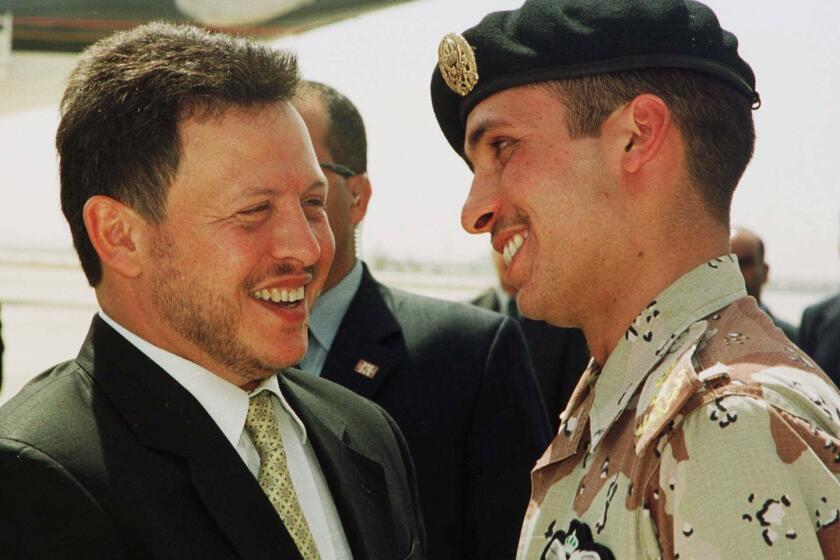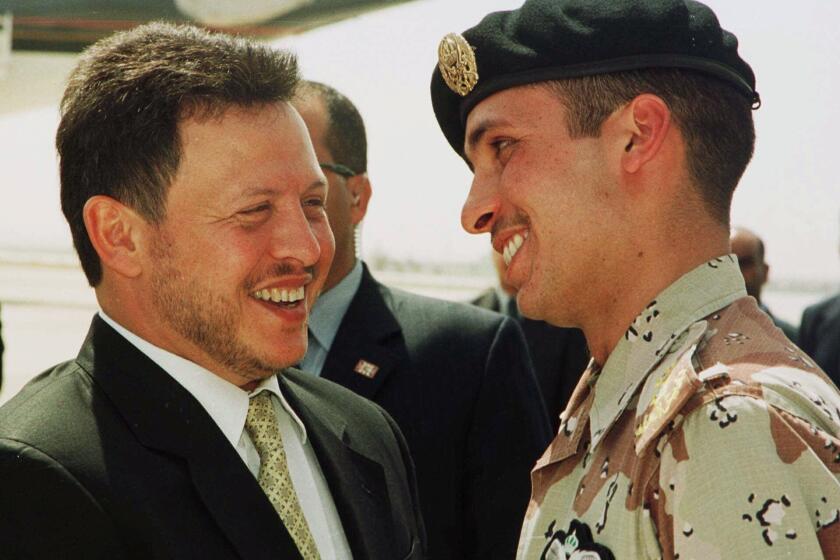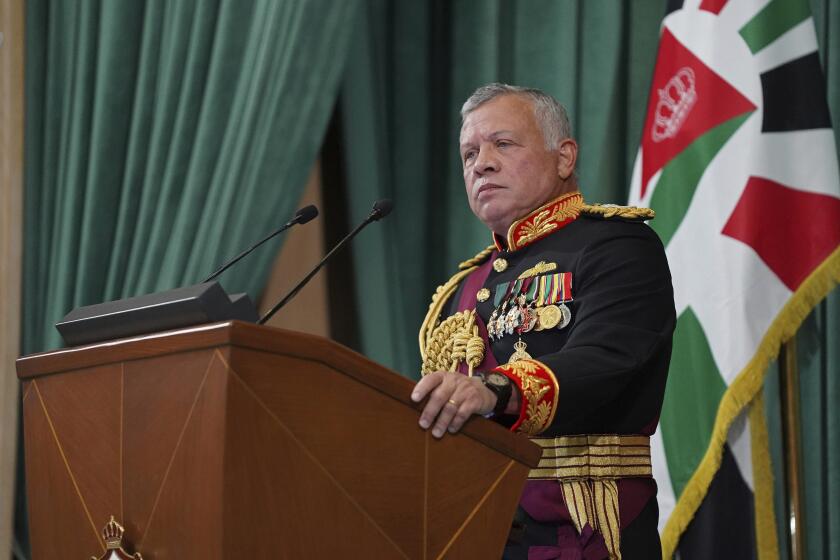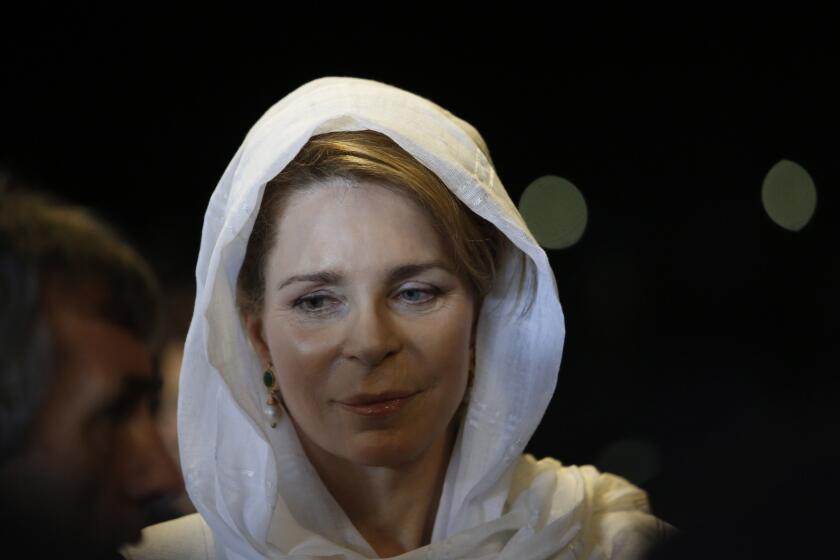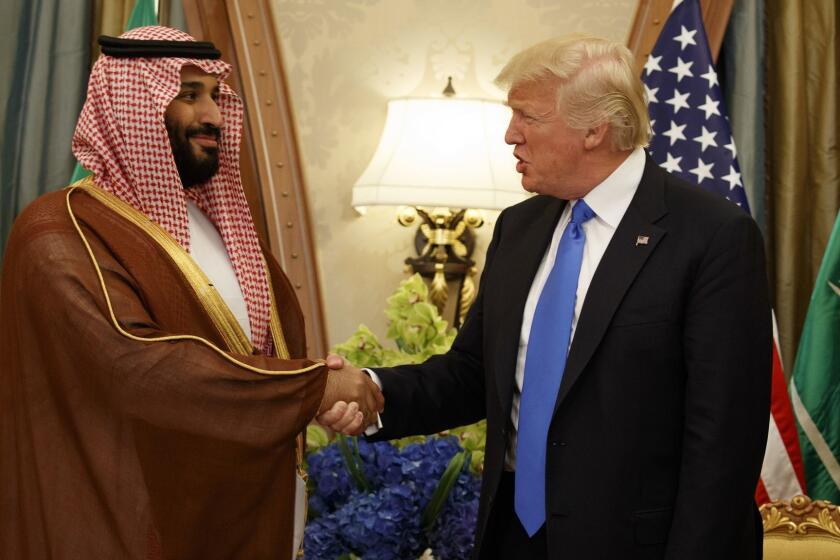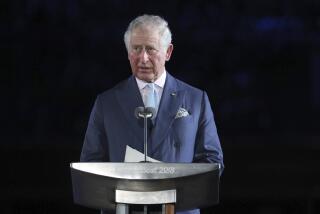A royal feud has some Jordanians asking: Is this the monarchy we want?
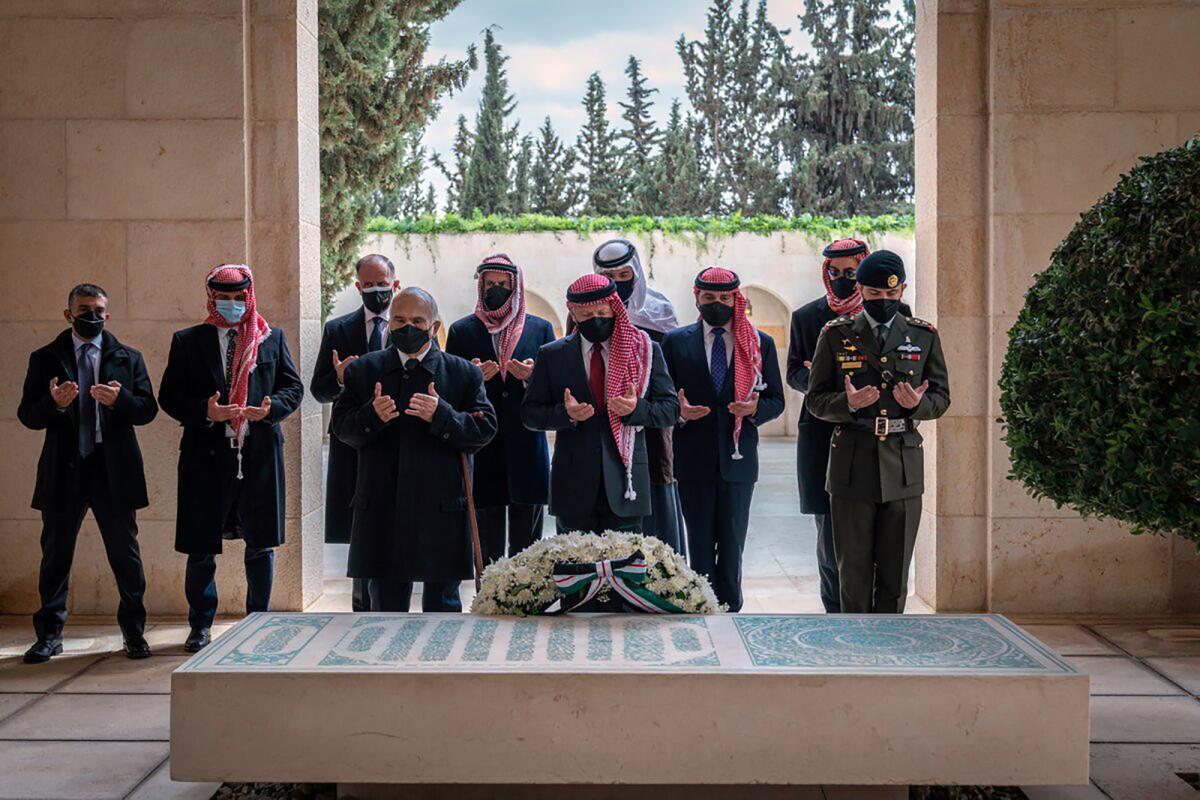
- Share via
AMMAN, Jordan — A century ago this month, the British created Jordan.
In possibly the world’s first instance of nation-building as consolation prize, they carved out a piece of desert with little water and even less oil from the ruins of the Ottoman Empire and gifted it to their Hashemite ally, Emir Abdullah bin Hussein, whose brother had been granted control of Iraq.
A hundred years later, the emir’s great-grandson, King Abdullah II, celebrated the centennial of a country few believed then would still exist. Dressed in a gold-braided military uniform, the king marched to bagpipe music April 11 along an avenue lined with soldiers. Later, officials unfurled an almost 7,000-foot-long Jordanian flag they hope will enter the Guinness World Book of Records.
But the stately pomp was belied by a surprising circumstance: namely, that Jordan’s monarchy is now embroiled in arguably its worst crisis ever, with many people here questioning its effectiveness, the political system that has ensured its survival and the price they themselves have paid to preserve the country’s much-vaunted stability.
The stark reappraisal was sparked by the shocking announcement April 3 that former Crown Prince Hamzah, Abdullah’s half-brother, had been caught in a purported plot to usurp the throne with the help of his loyalists and shadowy foreign backers. Some 18 of his alleged co-conspirators were arrested, the attempted treason was “smothered” and Prince Hamzah has firmly returned to the royal fold, Abdullah said.
But few believe the royal rift to be healed — or the king and the government’s explanation of what happened. Despite a gag order on the media, many Jordanians have taken to the internet to express their skepticism, saying that the crisis has lifted the lid on their country’s malaise and shown the need for real reform.
Jordan’s Prince Hamzah signed a statement saying he was loyal to his half brother.
While no one is calling yet for the monarchy’s abolition, some are urging that its power be shrunk, and wonder openly whether Abdullah is the right person at the helm.
“People believe more and more that if you add all the factors in the country together, including Hamzah’s story, it tells everybody the fact that there must be change,” said Labib Kamhawi, a veteran Jordanian political analyst here in the capital, Amman.
“Nobody wants to bring down the monarchy as such, but people want some serious change — and Hamzah offered himself as the champion of such change.”
Girding that growing conviction is Jordan’s dire economic situation, which is so close to the breaking point that officials privately warn the country is just over a week of lockdown away from bankruptcy. In recent years, Jordan has seen prices rise, at least a third of its youth unemployed and the widespread perception that corruption, not to mention mismanagement, has hollowed out its already meager resources.
The palace insists that Jordan’s royal house and the country are in order after the detention of Prince Hamzah. Many are skeptical.
When authorities placed Prince Hamzah under de facto house arrest and cut off his communications April 3, those were the issues he used to fight back with in a pair of videos leaked to the BBC.
“This country has become stymied in corruption, nepotism and in misrule, and the result has been the destruction or the loss of hope that is apparent in pretty much every Jordanian,” he said.
At the heart of those complaints, but rarely explicitly mentioned, is the king, who can assign and replace Cabinets at will — a power he has often exercised, sacrificing ministers or entire governments to deflect popular anger.
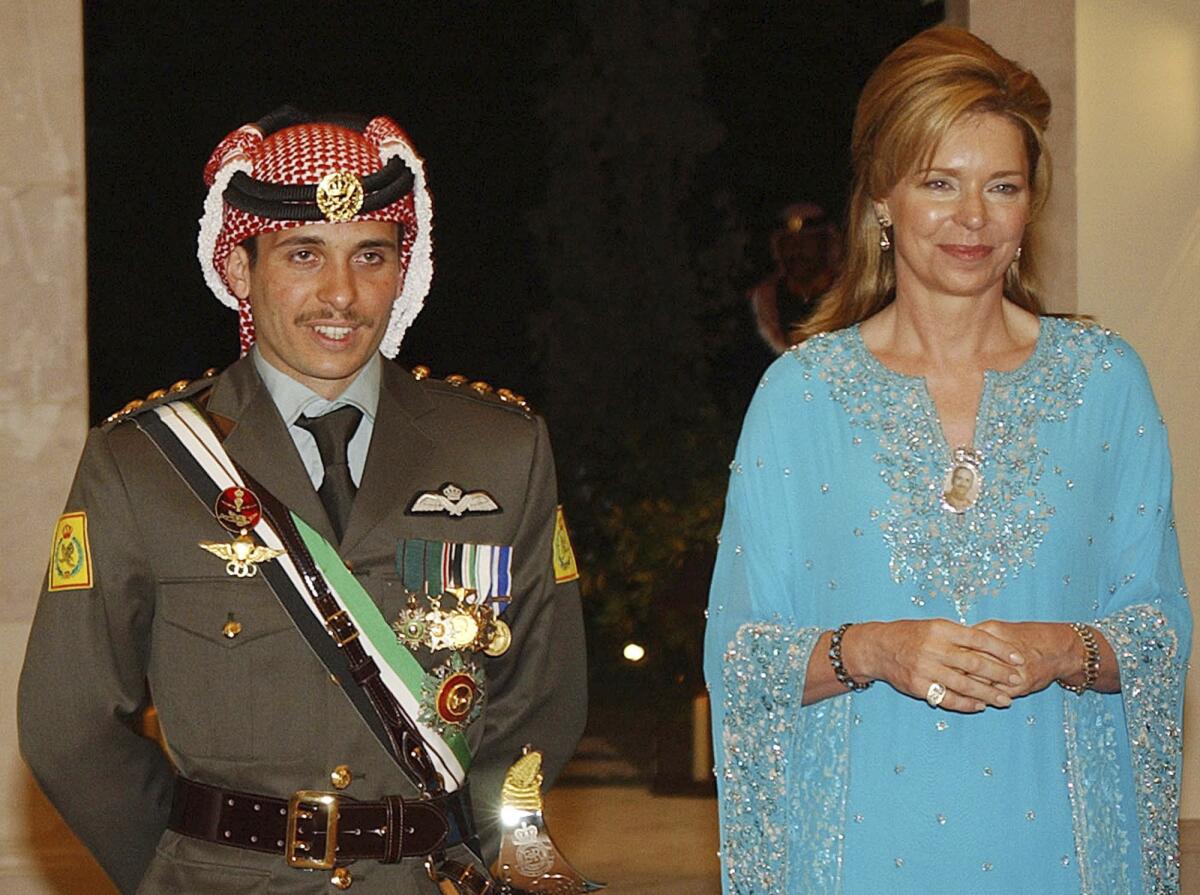
“The king in recent years brought on weak governments that put him on the front line, where he began interfering in the details of the country’s day-to-day running,” said Amer Sabaileh, a Jordanian analyst. “Now people see that bad governance is coming from the palace.”
Critics also point out that the palace had become a shadow government, creating commissions and supranational entities that in effect hijacked ministries’ roles.
“The palace set up institutions with qualified people that took over the role of the government because of the feeling that they could do it faster, more efficiently, with less constraints,” said Rami Khouri, a journalism professor at the American University of Beirut and a former television show host in Jordan. “But what this did is that it emasculated the government. It became simply an employment agency.”
Jordan’s tribes have long been the kingdom’s bedrock and a source of support for the monarchy. But accusations of seditious scheming may change that.
Accompanying that has been an over-reliance on the security services, which are now involved in vetting government projects as well as personnel for government contracts, giving them outsize control over economic and political affairs.
For decades, the rule that held in Jordan appeared to be stability over democracy. Although the 2011 Arab Spring protests spilled over into the country, they were short-lived; there were some calls for the regime’s downfall, like those by demonstrators in neighboring countries, but Jordanians’ main gripe was the loss of subsidies and King Abdullah’s economic liberalization drive. And as chaos bloomed in Egypt, Libya and Syria along with the rise of Islamic State in neighboring countries, there was less appetite for change.
But in the years since, critics say the Jordanian state has become totally intolerant of dissent, despite the king famously declaring that “the sky’s the limit” when it comes to his subjects’ freedom of expression. Instead, security services routinely intimidate opponents and rig elections to make sure no coherent opposition can rise.
Earlier this year, the Economist Intelligence Unit’s Democracy Index labeled Jordan an authoritarian country, while the U.S.-based think tank Freedom House downgraded the country’s rating from “partly free” to “not free.”
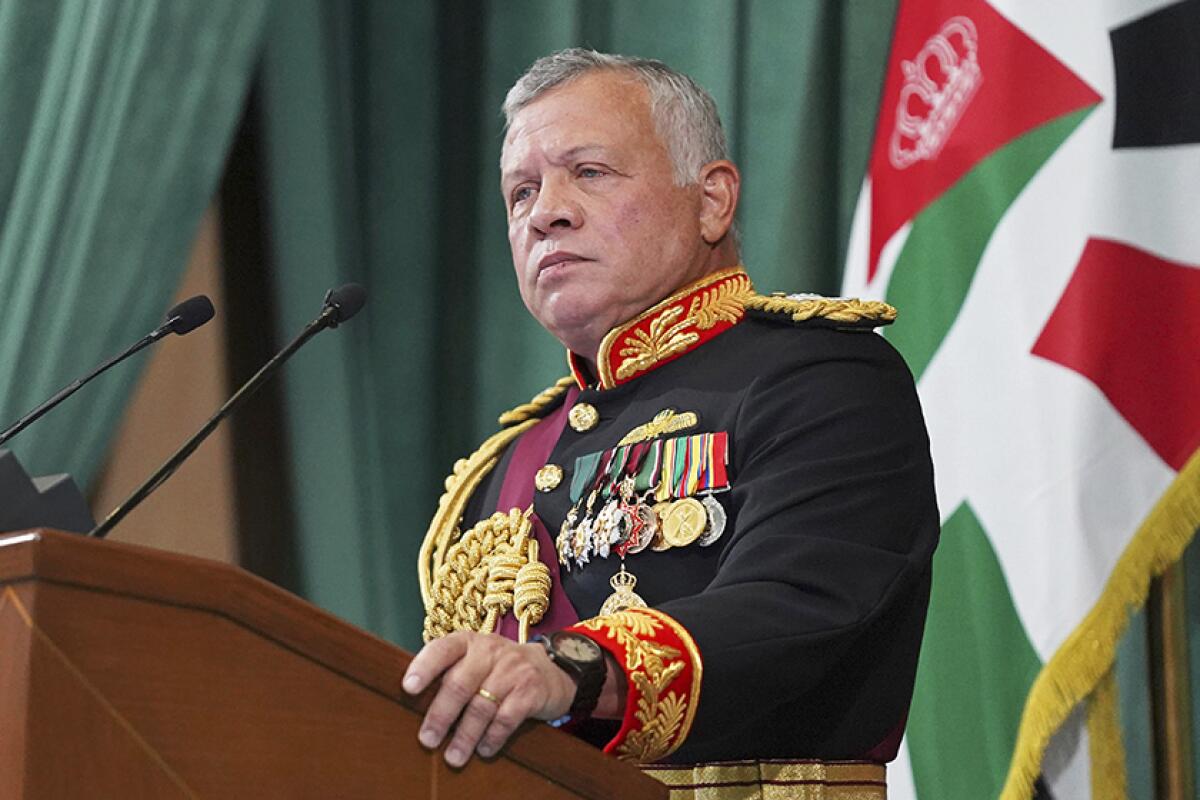
In his diatribe against the country’s leadership, Hamzah railed about the loss of freedoms — though he carefully avoided mentioning his half-brother the king by name.
“It’s reached the point where no one is able to speak or express an opinion on anything without being bullied, arrested, harassed and threatened,” he said in one of the leaked videos.
Those words became a rallying call in the wake of his detention, with Jordanians plucking quotes from Hamzah’s recordings to use in hashtag campaigns on social media as they called for his release.
“We stand with Prince Hamzah because he spoke of the nation’s pains and concerns,” tweeted Mohammad Majali, a Jordanian activist. “He was shackled and not allowed to speak, like so many other Jordanians whose mouths have been gagged through different means.”
Who is Queen Noor? Royal drama emerges, nearly 43 years after an American’s marriage to Jordan’s King Hussein.
The anger has since translated into more urgent demands for political change, including calls for a parliamentary government with the prime minister elected rather than appointed, and a constitutional monarchy, reducing the king’s role to a ceremonial position like that of Queen Elizabeth II’s in Britain.
Others see in Prince Hamzah, who looks and speaks like his father, the beloved King Hussein, a more appropriate fit for monarch than Abdullah, whom many view as an outsider focused more on the welfare of the business elite rather than ordinary Jordanians.
The turmoil here could prove problematic for the U.S. because of the outsize role Jordan enjoys as a top Middle Eastern ally and as a safe zone for many of the region’s refugees. In January, Washington signed a defense cooperation agreement with Amman to allow U.S. aircraft, ships and personnel to “freely enter and exit Jordanian territory without applying for a visa.”
The move, which in effect transforms Jordan into a U.S. military base, is likely to increase in importance as the Biden administration looks to withdraw troops from Afghanistan yet maintain the ability to conduct counterterrorism operations from a distance.
Leaders who invested heavily in their relationship with the president are having to consider the possibility of a Biden win.
Abdullah’s loyalists contend that he is interested in reform but that his plans are thwarted by powerful forces in the country, including conservative elements in his circle of advisors and the so-called East Bank tribes that dominate the civil service.
That argument has little resonance in the current climate, said Kamhawi, the political analyst.
“You can say this once or twice, but if nothing happens each time, then no one believes you,” Kamhawi said. He added that the dire economic picture had made people less willing to accept the state’s repressive tactics.
“People are saying there’s nothing to be afraid for,” he said.
Start your day right
Sign up for Essential California for the L.A. Times biggest news, features and recommendations in your inbox six days a week.
You may occasionally receive promotional content from the Los Angeles Times.
Whether Hamzah is the right alternative is beside the point, analyst Sabaileh said.
“The matter is no longer just about Hamzah. It’s what you can offer today in terms of economic and political reform,” he said.
“This is dangerous, because in 20 years the leadership have offered nothing. Even in times when there was no crisis, they couldn’t deliver. What can they do now?”
More to Read
Sign up for Essential California
The most important California stories and recommendations in your inbox every morning.
You may occasionally receive promotional content from the Los Angeles Times.
